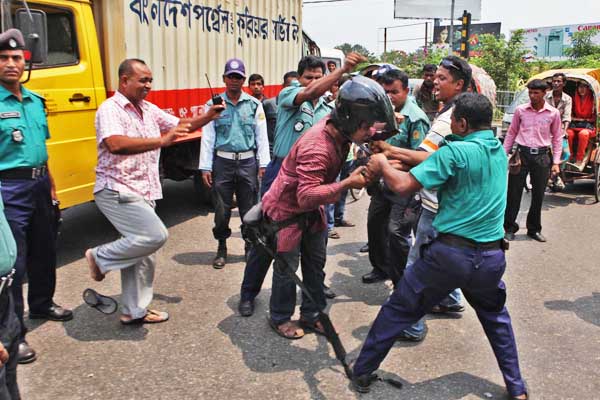By Fariha Karim
Intimidation is a hazard of the job for Nurul Kabir. The outspoken newspaper editor faced it during his first days on the beat as a reporter, and even before, as a student activist. ?Intimidation by the powers that be is a part of my life, and it has always been that way,? he said.
It was days after he had been warned to leave the country, and Kabir was back behind his desk at the New Age office, a slightly framed man behind a towering pile of books, papers and letters, a twist of smoke curling up from the cigarette in the ashtray beside him.
Most recently, his opponents have included the Bangladeshi military. He has been a vocal critic of the military-controlled caretaker government of the last two years, a consistent thorn in their side, doing his job as a responsible journalist and shining a spotlight on those who wield power.
And his comments, repeated again and again in his newspaper and during talkshows on private TV channels, have included demands for a strong army in the interests of the security of the nation state. For this to happen, he argues, military leaders need to stop meddling with politics.
Now, unconfirmed reports say he is being threatened by the military. Sources claim his life is in danger, and he has heard that army officers have demanded ?Nurul Kabir has to be taken care of?.
A few days ago, his fresh-faced young driver, Nazib, 20, was threatened at gunpoint during a terrifying car chase which left him barely able to breathe. As he made his way home alone after dropping off his boss, he was followed and criss-crossed by six men riding two super powered Honda motorbikes.
?I thought they were going to kill me,? Nazib said. ?All of them were wearing green helmets, and the guy in the middle, he had something sticking out of his arm, like a gun, and was pointing it at me. I was driving at over 100 miles per hour, and I still felt like the car wasn?t working.?
But why is it that a man who is trained to write is seen as a threat by men who are trained to kill?
Maybe it’s because Nurul Kabir has built up his own following of unwavering supporters disciplined by facts and argument instead of military drill, largely through appearing on talkshows. And this has taken place because of the courage of his colleagues who have given him the airtime. Before the military-controlled caretaker government, public criticism of the military was largely taboo. But the last couple of years have shown that journalists are prepared to resist in the most dangerous of circumstances. When ex-President Iajuddin Ahmed declared a state of emergency, threatened censorship and longer prison sentences, coverage of the more unwanted aspects of the regime grew.
And there was a cost ? journalists were arrested, tortured, and in the case of Dainik Giri Darpan correspondent Jamal Uddin, feared killed (though the official explanation was suicide). The country?s first 24-hour news channel, CSB, was pulled from the airwaves following footage of violent clashes between students and police at Dhaka University, and Ekushey was also heavily leaned on.
None of the perpetrators were brought to justice, and the attacks continued. So did the journalists. Private broadcasters defied bans to stop airing news and current affairs programmes. despite the risks. And of course, the public tremendous desire to consume current affairs, aided by the growth of television in rural areas, spurred them on.
Now, the guns are trained on Kabir ? and his poor, innocent driver ? at one of the most sensitive of times, in the wake of the BDR rebellion which claimed the lives of four civilians, six BDR soldiers, and 56 officers. It is one of the greatest losses of officers suffered in the history of the country. But, according to Kabir, “they?re conspiring to harm me when they?re not in power. Now there is an elected government. If I?m killed tomorrow, the government will get the blame. And they?re using this [the aftermath of the rebellion] as an opportunity, when officers are emotionally charged.?
From their most recent record, journalists and their co-workers have shown they are prepared to fight against the harshest of odds. When the state has upped the ante, so have they. Condemnation of the car chase has come not only from colleagues in the Dhaka Union of Journalists but also other quarters, including architecture, anthropology, women?s rights activists and judges.
As long as the state continues to try and silence this man, they?re in for the big fight. The battle lines have been drawn.

